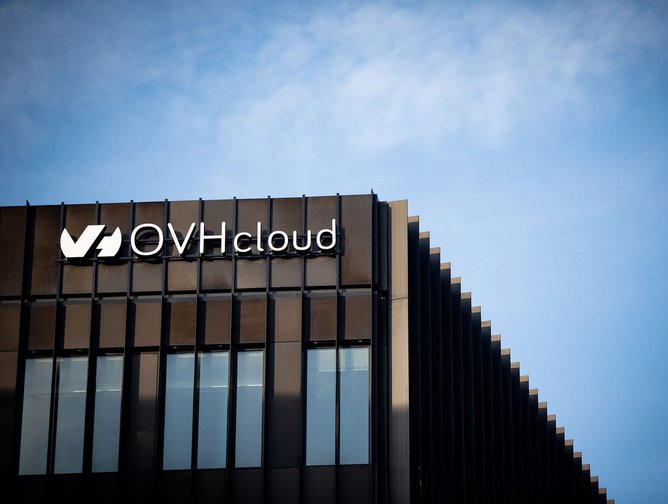Top 10 cloud computing companies (how they stack up)

Cloud computing has become a game-changer in the dynamic era of technology, allowing companies to grow, innovate, and reinvent their operations.
In this list, we explore cloud computing companies that are revolutionising the business world with their latest technology and extensive service offerings.
These organisations, which range from market leaders to advanced contenders, are at the forefront of the cloud revolution, which is progressing industries toward increased productivity, adaptability, and global connectedness.
They have positioned themselves as pioneers, driving the direction of the industry with their cutting-edge solutions and groundbreaking technologies. Their relentless pursuit of excellence has revolutionised how businesses in today’s competitive environment experience unprecedented efficiency, scalability, and agility.
Join us as we examine these top cloud providers' transformational potential and their crucial role in determining the digital world's course.
1
Amazon Web Services (AWS)
As the undisputed leader in the cloud services industry, AWS boasts an extensive global client base comprising millions of customers. Offering a remarkable portfolio of more than165 fully featured services, AWS consistently raises the bar for cloud computing solutions.
The cloud provider offers a vast array of services, tools and infrastructure to support businesses and individuals in leveraging the power of the cloud for their computing needs.
The company achieved an astounding revenue of $25.6 billion in 2018, establishing its dominant position in the market. In 2022, AWS recorded a significant milestone by generating revenues of US$80 billion through its comprehensive suite of cloud services.
Features
- Streamlined registration process
- Quick and hassle-free deployment
- Flexible capacity management (add or remove as needed)
- Unlimited access to scalable resources
- Simplified billing system
Pros
- User-friendly setup
- Extensive range of over 200 services
- Ability to host static websites
- Enables development of scalable and adaptable complex applications
Cons
- Persistent occurrence of AWS cloud service glitches
2
Microsoft Azure
Microsoft Azure is a strong competitor in the cloud services market thanks to its explosive expansion.
Recent accomplishments, such as a US$10 billion government deal, have strengthened its standing. The company's sales have achieved significant levels in several areas, including Productivity and Business Processes, Intelligent Cloud, and Personal Computing. In Q3 of fiscal year 2023, Microsoft earned around US$22.1 billion in revenue from its intelligent cloud services.
These services are provided through Azure, Microsoft's platform for cloud computing, benefiting numerous customers.
Features
- Application management and deployment
- Supports diverse OS, languages, frameworks, and databases
- Consistent tooling across clouds
- Scalable IT resource capabilities
Pros
- Highly scalable
- Cost-effective
- Flexible
- Offers free trial
Cons
- Requires expert management
3
IBM Cloud
The IBM Cloud is a full-suite cloud solution that allows businesses to easily build, deploy and manage applications seamlessly. This platform offers various services to address diverse business requirements, including computing, storage, networking, AI, analytics, and more. With a strong focus on security, scalability, and reliability, IBM Cloud offers a robust infrastructure for managing applications.
IBM Cloud's global presence, along with enterprise-grade features, and integration capabilities make it an apt choice for organisations seeking advanced cloud solutions to accelerate their innovation, optimise operations, and drive business growth. IBM Cloud counts EY, Etihad, KPMG and American Airlines among clients. Google Cloud now brings Generative AI to organisations by uniting Google's foundation models with enterprise search and conversation AI to help you build transformative applications powered by your data.
According to IBM's FY-2022 Q4 earnings report, the company's hybrid cloud revenue surpassed US$22 billion, marking an 11% growth compared to the previous year.
Features
- SaaS, PaaS, and IaaS offerings
- Cloud backup and recovery capabilities
- Utilise diverse tools, data models, and delivery models to create innovative services
- Robust network management
Pros
- Regularly introduces new integrations and products
- Flexible pricing options
- Impressive computational power
- Emphasises a data-first approach in line with market demand
Cons
- Relatively limited number of data centres
- Customer support responsiveness could be improved
4
Google Cloud
A wide range of services are available through the Google Cloud Platform, from networking and storage to AI and machine learning. Google Cloud is a dependable option for companies looking for cutting-edge cloud solutions because of its broad product selection and availability in different locations worldwide.
Google Cloud offers several packages that can be tailored to suit businesses of all sizes, facilitating innovation, collaboration, and digital transformation in today's fast-paced technological landscape.
Alphabet, the parent company of Google, announced a significant increase in cloud revenue for Q1 2023. They reported a revenue of US$7.4 billion, surpassing the US$5.8 billion from Q1 2022 and slightly exceeding the US$7.32 billion recorded in Q4 2022.
Features
- Data Visualisation
- Workflow Management
- Data Export/Import
- Comprehensive reporting and statistics
Pros
- Ample data storage capacity
- Robust data analysis capabilities
- Well-suited for cloud-native businesses
- Impressive portability
Cons
- Limited number of data centres
- Relatively fewer features available
5
Oracle Cloud
Oracle Cloud, which offers a comprehensive range of cloud services, including infrastructure, platform, and software, is a dominant participant in the market since it focuses on data management, application development, and security while meeting various organisational demands. The platform encompasses services such as computing, storage, networking, database management, AI, and analytics, catering to diverse business requirements.
FY2022 revenues rose by 5% in USD and 7% in constant currency to US$42.4 billion. Cloud services and licence support revenues increased by 5% in USD and 6% in constant currency to US$30.2 billion. Cloud licence and on-premise licence revenues grew by 9% in USD and 12% in constant currency to US$5.9 billion.
Features
- Comprehensive cloud services
- Infrastructure, platform, and software options
- Data management focus
- Application development capabilities
- Emphasis on security
Pros
- Wide range of cloud offerings
- Strong data-driven environment
- Connect, develop, and share data easily
- Reduces IT complexity
- Trusted and established provider
- Scalable and flexible options
Cons
- May have a learning curve
- Pricing can be complex
- Limited customisation options
6
Alibaba Cloud
Alibaba Cloud, China's biggest cloud service provider, has expanded its offerings outside of the country, though it remains the number cloud provider in China and in Asia-Pacific, according to IDC.
With its extensive portfolio of services and products, including elastic computing, storage, and IoT, Alibaba Cloud is revolutionising enterprises worldwide, with clients including Ford, JBC and AirAsia. The company provides various cloud computing services to businesses, including data storage, CDN, relational databases, and anti-DDoS protection.
Alibaba Cloud, a subsidiary of Alibaba Group, generated US$11.76 billion in global revenues in 2022.
Features
- Elastic computing
- Storage solutions
- Internet of Things (IoT)
Pros
- Extensive service portfolio
- Market presence
- Global expansion
- Revenue growth
Cons
- China-centric focus
- Potential language barriers
- Competition in the cloud market
7
Tencent Cloud
Tencent Cloud, China's second-largest cloud service provider, offers diverse cloud solutions. With a strong presence in Mainland China and strategic operations in the US, Brazil, Germany, and Asia Pacific, Tencent Cloud has become a significant player in the global cloud industry.
As a subsidiary of Tencent, one of the world's biggest tech companies, Tencent Cloud's robust infrastructure, reliability, and scalability enable organisations to leverage cloud computing for improved agility and efficiency.
The cloud provider's Q1 2023 highlights include 17% growth in online ad revenue to 21 billion yuan (US$2.92 billion), 14% growth in fintech and business services revenue to 48.7 billion yuan (US$6.77 billion), and 11% increase in net profit to 25.83 billion yuan (US$3.59 billion).
Features
- Wide range of cloud solutions
- Strong presence in Mainland China
- Operations in multiple continents
Pros
- Large and established provider
- Extensive range of services
- Strong focus on the Chinese market
- Global presence and reach
Cons
- Mainly focused on Chinese market
- Limited presence in certain regions
- Potential language and cultural barriers
- Competition from other cloud provider
8
OVHcloud

Offering bare metal, hosted private cloud, and public cloud services, OVHcloud is a cloud service provider focused on Europe.
OVHcloud serves a diversified client base, operating across several data centres in different nations and offers a plethora of packages; you can pick one in line with your specific needs and budget.
In FY2022, OVHcloud generated revenues of €788 million (US$860.72m) with adjusted EBITDA amounting to €308 million (US$336.42) and current EBITDA reaching €277 million (US$302.56).
Features
- Bare metal servers
- Hosted private cloud
- Public cloud services
- Diversified client base
- Multiple data centres
- Affordable solutions
Pros
- Wide range of cloud services
- Focus on Europe
- Cost-effective solutions
- Scalable infrastructure
Cons
- Limited global presence
- Potential latency issues for non-European users
9
DigitalOcean
DigitalOcean is a great option for developers, start-ups, and small to medium-sized organisations to access infrastructure and platform resources. Loved especially by the developer community, DigitalOcean is super easy to use, as they prioritise simplicity.
The platform offers a wide range of pre-configured droplets (virtual machines) and one-click application installations, making it convenient for developers to start their projects.
For the second quarter of 2023, based on information available as of May 9, 2023, DigitalOcean says it expects total revenue of US$169.5 to US$170.5 million, an adjusted EBITDA margin of 37% to 38%, and a non-GAAP diluted net income per share of $0.40 to $0.41.
Features
Scalable infrastructure
- Developer-friendly tools
- SSD storage
- Multiple data centre locations
- Flexible pricing options
Pros
- Easy to use
- Fast and reliable performance
- Cost-effective
- Robust community support
Cons
- Limited services compared to other cloud providers
- May require more technical knowledge
- Some users report occasional downtime
10
Linode and Akamai
Linode, now under the ownership of Akamai Technologies, has strengthened its position as a leading provider of computing and storage services. The company uses its extensive global network of data centres to offer reliable and highly scalable cloud solutions to its global clients. These clients depend on Linode's robust infrastructure to meet their evolving requirements, benefiting from a network that guarantees excellent performance and dependability.
With its established reputation in the industry, Linode remains committed to delivering exceptional cloud services that empower businesses of any scale.
Features
- Compute and storage services
- Global network of data centres
- Dependable and scalable cloud solutions
Pros
- Significant market presence
- Diverse client base
- Reliable performance
Cons
- Limited number of data centres
- Potential for high costs
- Technical expertise required
- Meet Manish Sharma, the new CEO of Accenture North AmericaLeadership & Strategy
- The executive guide to a successful digital transitionDigital Strategy
- The best new books every CEO should read this summerLeadership & Strategy
- Tech CEO Frank Calderoni on creating a character-led cultureLeadership & Strategy






